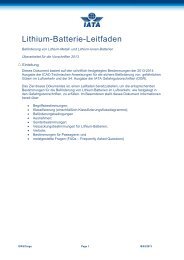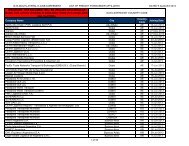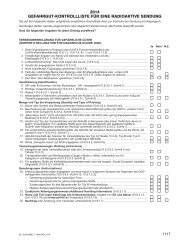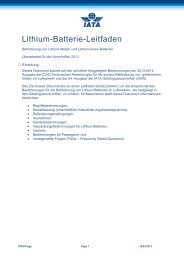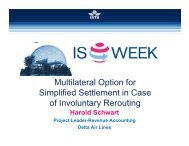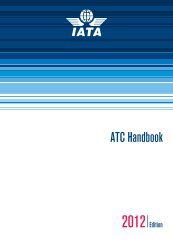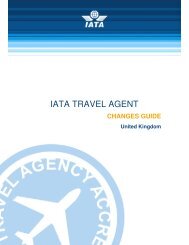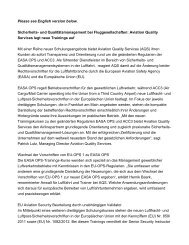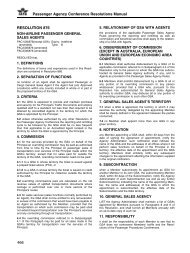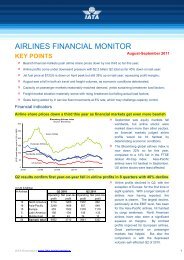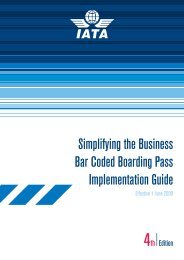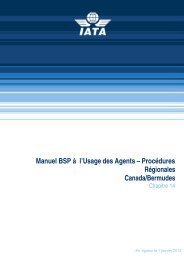You also want an ePaper? Increase the reach of your titles
YUMPU automatically turns print PDFs into web optimized ePapers that Google loves.
SECURITY<br />
Achieving convenient and<br />
effective security.<br />
Governments and the industry<br />
must continue to work<br />
together to replace inflexible<br />
security measures with<br />
harmonized and responsive<br />
security systems based on<br />
data and risk management.<br />
39<br />
countries<br />
Currently impose API with<br />
another 32 countries<br />
in the pipeline.<br />
7<br />
countries<br />
Require access to PNR<br />
data with another 29<br />
countries to follow suit<br />
(mostly in the EU).<br />
The safety and security of passengers<br />
is always the number<br />
one concern for airlines. Since<br />
2001, flying has become much<br />
more secure, but this has come<br />
at the cost of greater passenger<br />
inconvenience. With around<br />
700 million extra passengers<br />
expected to fly by 2015,<br />
fundamental improvements to<br />
the security system are needed<br />
to further strengthen security<br />
and deliver a better customer<br />
experience.<br />
Through the concerted efforts<br />
of <strong>IATA</strong> and its industry partners,<br />
many regulatory authorities<br />
are including the industry<br />
in their security deliberations<br />
at a much earlier stage than<br />
was previously the case.<br />
Since 9/11, aviation has been<br />
subjected to a large number of<br />
security regulations, many implemented<br />
unilaterally. Aviation<br />
is a global business, however,<br />
and aviation-related regulations<br />
must, as much as possible, be<br />
agreed upon and implemented<br />
globally. The security regulatory<br />
framework should be designed<br />
to recognize the unique challenges<br />
facing aviation and<br />
should follow a risk-based,<br />
data-driven approach.<br />
For some years, governments<br />
worldwide have been<br />
making use of Advanced<br />
Passenger Information (API)<br />
and Passenger Name Record<br />
(PNR) programs to aid border<br />
security. Information of this<br />
kind is a crucial tool in the<br />
fight against terrorism and<br />
illegal activity. Previously, the<br />
standards for the transmission<br />
of such data were not always<br />
harmonized. In 2011, several<br />
“<strong>IATA</strong> is promoting a checkpoint of<br />
the future, which I strongly endorse.”<br />
John S. Pistole, US TSA Administrator, interview on C-SPAN 10 August 2011.<br />
22<br />
Through a closer relationship<br />
with authorities, the industry<br />
is helping to shape and harmonize<br />
the security regulatory<br />
framework.<br />
data-alignment initiatives were<br />
successfully concluded to<br />
round out the tools available to<br />
countries. ICAO has updated<br />
its passenger data blueprint<br />
based on these agreements,<br />
and <strong>IATA</strong> has led efforts to<br />
create new PNR message<br />
standards and to standardize<br />
the use of Extensible Markup<br />
Language (XML).<br />
Other <strong>IATA</strong> efforts resulted in<br />
India committing to a single<br />
window for the receipt of passenger<br />
data and adopting the<br />
United Nations EDI directories<br />
for administration, commerce,<br />
and transport (UN/EDIFACT)<br />
message standard. Globally,<br />
paper is being removed from<br />
security processes by regulators.<br />
During 2011, <strong>IATA</strong> worked<br />
with its industry partners to<br />
convince the US Customs<br />
Border Patrol to eliminate<br />
two widely used paper-based<br />
forms: I-92 and I-94W.



